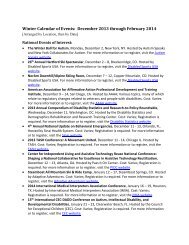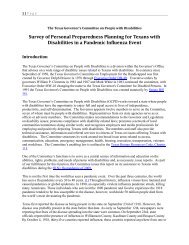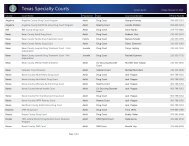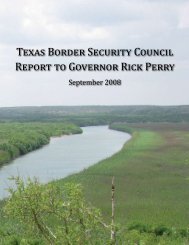Border Security Council Report - Office of the Governor - Rick Perry
Border Security Council Report - Office of the Governor - Rick Perry
Border Security Council Report - Office of the Governor - Rick Perry
You also want an ePaper? Increase the reach of your titles
YUMPU automatically turns print PDFs into web optimized ePapers that Google loves.
Appendix C: Public Hearing and Open Meeting Minutes<br />
<strong>Border</strong> <strong>Security</strong> <strong>Council</strong> Public Hearing<br />
December 4, 2007 - San Antonio, Texas<br />
Members Present: Chair Carlos Cascos, Vice Chair Robert Holt, Sec. <strong>of</strong> Sate Phil Wilson, Judge Val Beard,<br />
Fred Burton, Sheriff T. Michael O’Connor, Allan Polunsky<br />
Members Absent: Buddy Garcia, Judge Becky Dean Walker, Sheriff Tomas Herrera, Scott McLaughlin<br />
I. Meeting called to order at 9:00 am by Chairman Cascos.<br />
II. U.S. and Texas pledge led by members <strong>of</strong> <strong>the</strong> audience.<br />
III. Introductions by <strong>Council</strong> members.<br />
IV. Presentation by Steve McCraw, Director, <strong>Office</strong> <strong>of</strong> Homeland <strong>Security</strong>, <strong>Governor</strong> <strong>Rick</strong> <strong>Perry</strong>.<br />
<br />
<br />
<br />
Review <strong>of</strong> previous <strong>Border</strong> <strong>Security</strong> <strong>Council</strong> hearings.<br />
Explained that a hearing in S.A. was necessary as what happens at <strong>the</strong> border affects <strong>the</strong> entire<br />
state.<br />
Previous public hearings revealed that Carrizo cane is a major threat and that southbound<br />
monitoring is an important tool.<br />
V. Chairman Cascos explained <strong>the</strong> legislature’s allocation <strong>of</strong> <strong>the</strong> $110M in state border security funds.<br />
VI. Public testimony:<br />
A. Freeman Sawyer, Private Citizen<br />
<br />
<br />
<br />
<br />
<br />
<br />
<br />
<br />
Thanked <strong>the</strong> <strong>Border</strong> Patrol for <strong>the</strong>ir hard work. Criminal aliens are some <strong>of</strong> <strong>the</strong> worst <strong>of</strong>fenders<br />
in <strong>the</strong> country. Criminal aliens typically commit crimes in o<strong>the</strong>r countries and <strong>the</strong>n come<br />
here.<br />
Concerned that <strong>the</strong> City <strong>of</strong> San Antonio is considering funding a day labor site. He believes<br />
that people cross <strong>the</strong> border due to available jobs and having an <strong>of</strong>ficial day labor center will<br />
act as a magnet. Wants <strong>the</strong> BSC to write a letter to <strong>the</strong> city attorney to prevent day labor<br />
sites. Comment from BSC: That is not in <strong>the</strong> <strong>Council</strong>’s scope.<br />
Comment by Steve McCraw: Explains <strong>the</strong> process <strong>of</strong> 287g training, which allows <strong>the</strong> federal<br />
government to train local law enforcement.<br />
Comment by BSC: As a sheriff, <strong>the</strong> biggest challenge is communication at all levels <strong>of</strong> law<br />
enforcement.<br />
Question by BSC: Do you know if TDCJ is participating in 287g training? No, TDCJ <strong>of</strong>ficers<br />
aren’t 287g trained as a whole; Steve McCraw says as soon as you are released from a Texas<br />
prison, you should be deported. 287g allows an <strong>of</strong>ficer to act as an agent for ICE. However,<br />
just because <strong>the</strong>y have <strong>the</strong> training to do <strong>the</strong> needed paperwork doesn’t mean that <strong>the</strong>y<br />
have <strong>the</strong> time.<br />
Question by BSC: Why is <strong>the</strong> ICE training in Alabama? Because that’s where <strong>the</strong> ICE facility is.<br />
Can we have a training program here? Probably, but that is a federal issue.<br />
Comment by BSC: ICE has <strong>of</strong>fered to train regionally, but <strong>the</strong> training is process-oriented,<br />
teaching <strong>the</strong> <strong>of</strong>ficers how to do paperwork.<br />
Question by BSC: What is <strong>the</strong> process from arrest to reporting to ICE? Response from Sheriff<br />
O’Connor: Someone gets arrested, <strong>the</strong> sheriff reports to ICE that <strong>the</strong>y suspect someone is<br />
illegally present. There needs to be a good, integrated system for <strong>the</strong> feds, state and locals<br />
to interact with each o<strong>the</strong>r.
















